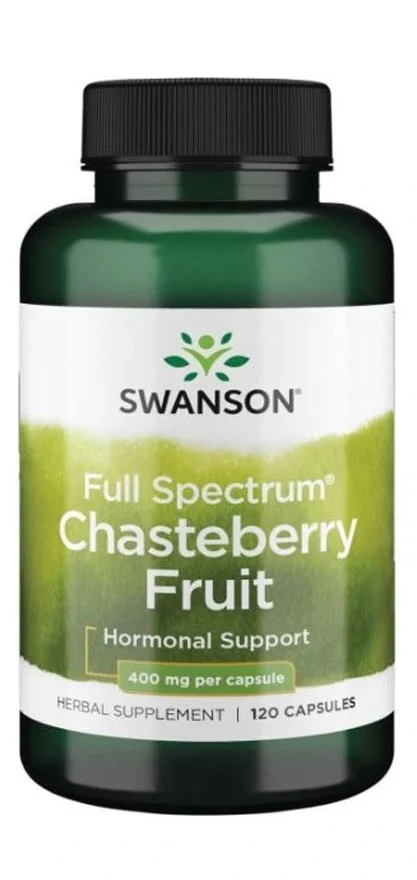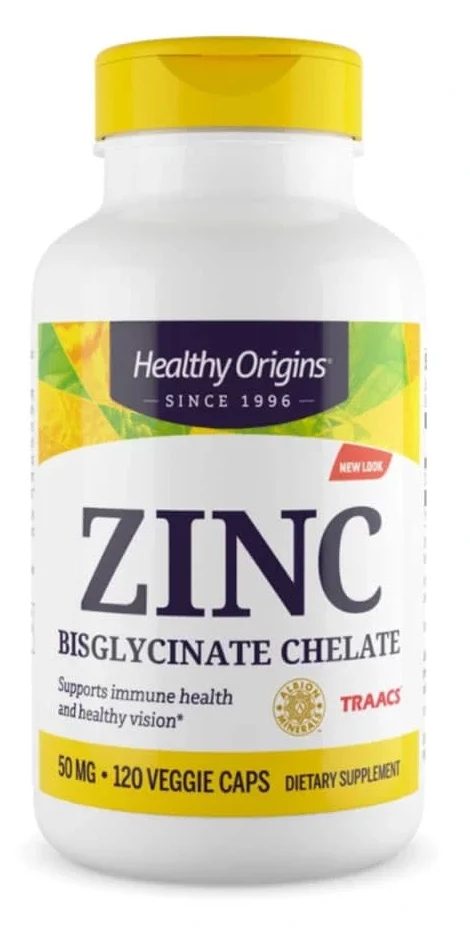Top 5 Supplements for Hyperprolactinemia That May Help Lower Prolactin Naturally
What Is Hyperprolactinemia | Symptoms | Causes of High Prolactin | 5 Supplements for Hyperprolactinemia | Where To Buy | Wrapping Up | Warnings And Side Effects | Disclaimer
Feeling off lately—tired, moody, or dealing with irregular periods or low libido? It might not just be stress. Elevated prolactin levels, also known as hyperprolactinemia, could be throwing your hormones out of sync.†
Prolactin is a hormone best known for its role in lactation, but when levels get too high, it can disrupt everything from your menstrual cycle to your sex drive and even your mood. While there are prescription treatments available, many people are looking for natural supplements to help lower prolactin and support hormone balance without side effects.†
In this post, we’ll break down what hyperprolactinemia is, common symptoms and causes, and the top 5 supplements that may help you manage it naturally.
What Is Hyperprolactinemia?
Prolactin is a hormone produced by the pituitary gland, a small but powerful gland located at the base of your brain. While prolactin is most commonly associated with stimulating breast milk production after childbirth, it actually plays a much broader role in both men and women. Prolactin helps regulate reproductive health, immune function, and even contributes to emotional regulation through its influence on dopamine levels. (1)
Under normal conditions, prolactin levels in the blood remain relatively low—typically under 20–25 ng/mL in women and 15 ng/mL in men, except during pregnancy, breastfeeding, or moments of intense physical or emotional stress. But when prolactin levels rise outside of these expected scenarios, the condition is known as hyperprolactinemia. (1,2,3)
Hyperprolactinemia Symptoms:
When prolactin levels are too high, your body starts sending signals—some subtle, others impossible to ignore. The symptoms of hyperprolactinemia can vary depending on your sex, age, and the underlying cause of the hormonal imbalance. For some, it may go unnoticed until fertility becomes an issue; for others, symptoms show up in everyday life, from mood changes to weight fluctuations. (4,5)
Common Symptoms in Women:
- Irregular or missed periods (amenorrhea): One of the most common signs. Prolactin suppresses the hormones responsible for ovulation.†
- Unwanted breast milk production (galactorrhea): Even if you’re not pregnant or breastfeeding.†
- Infertility: Ovulation becomes disrupted, making it difficult to conceive.†
- Low libido or vaginal dryness: Caused by shifts in estrogen and testosterone levels.†
- Acne or unwanted facial hair: Especially when prolactin is elevated alongside estrogen dominance or PCOS.†
Common Symptoms in Men:
- Low libido and erectile dysfunction: High prolactin lowers testosterone levels, affecting sexual performance and desire.†
- Gynecomastia (male breast tissue enlargement): A rare but possible side effect of elevated prolactin.†
- Infertility: Reduced sperm production due to hormonal imbalance.†
- Mood changes or depression: Often tied to low dopamine, which has a close relationship with prolactin regulation.†
Symptoms in Both Men and Women:
- Fatigue or brain fog: Linked to hormonal disruption and lower dopamine.†
- Headaches or vision problems: Especially if a pituitary tumor is involved.†
- Anxiety or irritability: Prolactin and dopamine have an inverse relationship—when one goes up, the other often goes down.†
- Weight gain or difficulty losing weight: Especially if metabolism slows due to hormone imbalance.†
Bottom Line?
If you’re noticing several of these symptoms—especially alongside irregular cycles, libido changes, or infertility—it might be worth asking your healthcare provider to check your prolactin levels. Catching hyperprolactinemia early can make a big difference in your overall health and quality of life.
Causes of High Prolactin:
Understanding what’s driving elevated prolactin is key to finding the right approach—whether that’s through lifestyle changes, supplements, or medical treatment. Prolactin can rise for a variety of reasons, and not all of them are serious. Sometimes, the cause is temporary or easily corrected. Other times, it points to something deeper going on in the body. (1,2,3,4,5)
Here’s a breakdown of the most common causes of hyperprolactinemia:
1. Pituitary Tumors (Prolactinomas)
- What it is: A benign (non-cancerous) tumor on the pituitary gland that causes excess prolactin production.†
- How common? The most common type of hormone-secreting pituitary tumor.†
- Signs to watch for: Headaches, vision changes, extreme fatigue, and very high prolactin levels (often over 100 ng/mL).†
2. Hypothyroidism (Low Thyroid Function)
- When thyroid hormone levels drop, the body increases TRH (thyrotropin-releasing hormone), which can indirectly raise prolactin.†
- Fixing the thyroid often brings prolactin back down naturally.†
3. Medications
Several prescription drugs can elevate prolactin by interfering with dopamine, the brain chemical that normally keeps prolactin in check:
- Antipsychotics (e.g., Risperidone, Haloperidol)†
- Antidepressants (especially SSRIs)†
- High-dose birth control pills†
- Blood pressure meds (like verapamil)†
- Opioids†
If you’re on any of these, talk to your doctor before stopping—there may be alternatives or ways to manage side effects.†
4. Stress (Physical or Emotional)
- Cortisol and prolactin often rise together during chronic stress.†
- Lack of sleep, overtraining, and burnout can all contribute to higher prolactin levels by lowering dopamine.†
5. PCOS (Polycystic Ovary Syndrome)
- Some women with PCOS show mildly elevated prolactin, especially if estrogen dominance is involved.†
- It’s not the primary cause, but it can be part of the hormonal imbalance.†
6. Chest Wall Irritation or Injury
-
Any kind of stimulation to the chest—such as from surgery, trauma, or even tight-fitting bras—can stimulate the nerves that trigger prolactin release.†
7. Pregnancy and Breastfeeding
-
These are natural causes of elevated prolactin and are not considered problematic, unless levels remain high long after weaning or delivery.†
When to Get Checked
If you’re dealing with irregular cycles, low libido, infertility, or unexplained mood changes—and especially if you’re on medications known to affect dopamine—it’s worth testing your prolactin levels. Finding the root cause is step one.†
5 Supplements for Hyperprolactinemia:
Looking to support prolactin balance naturally? While supplements aren’t a substitute for medical treatment when needed, certain herbs and nutrients may help your body bring high prolactin levels back into range, especially when elevated due to stress, lifestyle, or mild hormonal imbalances.†
Here are five of the most talked-about prolactin control supplements:
1. Vitamin B6 (Pyridoxine)
-
Role in Prolactin Regulation:
Vitamin B6 is a key co-factor in the synthesis of dopamine, the neurotransmitter that naturally inhibits prolactin release. (6,7,8) -
Evidence & Benefits:
Small clinical studies and case reports suggest that supplementing with B6 can lead to modest drops in elevated prolactin levels. (6,7,8) -
Dosage:
50–200 mg per day, ideally split into two doses with meals.† -
Cautions:
High doses over 200 mg daily may cause nerve irritation; stick to recommended amounts and consult your doctor if you have neuropathy. (9)
2. Vitex Agnus-Castus (Chasteberry)
-
Role in Prolactin Regulation:
Vitex acts on the pituitary gland, promoting a healthy balance of luteinizing hormone (LH) and follicle-stimulating hormone (FSH), which indirectly helps normalize prolactin production. (10,11) -
Evidence & Benefits:
Clinical trials in women with PMS and menstrual irregularities have shown that Vitex can lower elevated prolactin and improve cycle regularity. (10,11) -
Dosage:
200–400 mg of standardized extract once daily, preferably in the morning.† -
Cautions:
It may take 3–6 months to see full effects. Avoid if you’re pregnant, breastfeeding, or on hormonal contraceptives without medical advice. (12)
3. Zinc
-
Role in Prolactin Regulation:
Zinc supports dopamine synthesis and helps maintain healthy testosterone and estrogen balance, both of which can influence prolactin levels. (13,14,15) -
Evidence & Benefits:
Supplementation has been linked to reduced prolactin in men and women, especially when baseline zinc status is low. (13,14,15) -
Dosage:
15–30 mg per day, ideally as zinc picolinate or citrate with food.† -
Cautions:
Excess zinc can impair copper absorption; consider cycling or using a balanced mineral formula. (16)
4. Mucuna Pruriens (Natural L-Dopa)
-
Role in Prolactin Regulation:
Mucuna contains L-Dopa, a direct precursor to dopamine, which powerfully suppresses prolactin secretion. (17,18,19) -
Evidence & Benefits:
Research in both animals and humans shows Mucuna can boost mood, libido, and overall dopamine tone, often with parallel decreases in prolactin. (17,18,19) -
Dosage:
Start low at 100–200 mg of extract (standardized to 15% L-Dopa) once daily, work up slowly.† -
Cautions:
May cause nausea or palpitations at high doses; not recommended for long-term high-dose use without supervision. (20)
5. Ashwagandha (Withania somnifera)
-
Role in Prolactin Regulation:
Ashwagandha is an adaptogenic herb that helps modulate the stress response, lowering cortisol and potentially reducing stress-induced prolactin spikes. (21,22,23) -
Evidence & Benefits:
Clinical trials show Ashwagandha can improve stress resilience and normalize HPA-axis function, which may indirectly help keep prolactin in check. Anecdotally, many report improved mood and libido. (21,22,23) -
Dosage:
300–600 mg of a standardized root extract (with at least 5% withanolides) per day, ideally split into two doses with meals.† -
Cautions:
Generally well-tolerated, but may cause mild digestive upset or sleepiness in some. Avoid if you have autoimmune thyroid conditions without medical guidance. (24)
Where To Buy?
If you’re exploring ways to support healthy prolactin levels naturally, visit SameDaySupplements.com. We carry a variety of supplements to support prolactin control—including essentials like Vitamin B6, Zinc, Mucuna Pruriens, and more—formulated to support hormonal balance and dopamine production. Whether you’re managing symptoms of hyperprolactinemia or looking to support reproductive health, you’ll find trusted options to fit your routine at SameDaySupplements.com.†
Wrapping Up!
This marks the end of our blog on Supplements for Hyperprolactinemia. Thank you for reading! And as always, if there is something that isn’t clear, another question you might have, or if you have another idea for a blog, email us!
Are you looking for more to read? Check out some of our other blogs!
- Creatine for Brain Health: Can This Popular Supplement Boost Your Mind?
- Best Supplements For Low Magnesium (Review & Guide)
- Coq10 Supplement For Fertility: An Overview of Recent Research
- Bringing Balance Back: How Thyroid Supplements Can Help You Feel Your Best
Warnings And Side Effects:
Not intended for use by persons under 18. If you are pregnant, nursing, taking any medications, or have any medical conditions, consult your doctor before use. Discontinue use and consult your doctor if any adverse reactions occur.
Disclaimer:
†Please note the intention of the information provided is for reference only. Furthermore, we are in no way providing medical advice or instruction. Instead, the information provided in this guide/blog utilizes anecdotal information and available studies/reviews. While we aim to maintain and display accurate information, we can’t guarantee it represents the latest product formulation or information. Therefore, please visit the manufacturer’s website if you have any concerns. Also, the information above does not represent our views here at Same Day Supplements. Instead, these are the manufacturers’ and users’ views and information. Additionally, the Food and Drug Administration has not evaluated these statements. Finally, these products aim not to diagnose, treat, cure, or prevent disease or illness.





